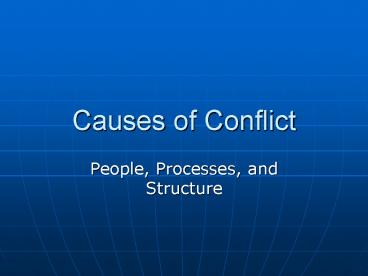Causes of Conflict - PowerPoint PPT Presentation
Title:
Causes of Conflict
Description:
Causes of Conflict People, Processes, and Structure System Structure: Image 3 Distribution of power (# poles) may influence global stability Neo-realists argue a ... – PowerPoint PPT presentation
Number of Views:101
Avg rating:3.0/5.0
Title: Causes of Conflict
1
Causes of Conflict
- People, Processes, and Structure
2
We begin with a basic point conflict ranges
from minor disagreements, feuds, and spats over
national policies, to various forms of violence
including terrorism and multiple kinds of war,
the worse being total nuclear war. We should ask
why is war waged?
3
Q. Why is it that most French citizens did not
fear the re-unification of Germany, even though
in WWI and WWII Germany was responsible for
hundreds of thousands of French casualties? What
would it take for the states like France,
Germany, UK, Japan, and the USA to fight each
other today? Realists would say it is bound to
happen.
4
System Structure Image 3
- Distribution of power ( poles) may influence
global stability - Neo-realists argue a bipolar system is most
stable less uncertainty, more effective
alliances. - US-USSR did not fight in Cold War
- Hegemonic Stability Theory one great power
orders and manages the system. Hegemon is more
likely to reduce conflict in system, unless their
own power erodes and is then challenged.
5
State Level Processes Image 2
- States vary by foreign policy. How?
- Varied degree of democracy
- Varied degree in economic interdependence
- Varied degree of international social
interactions and interconnectedness - Varied degree of trust in international
institutions
6
Other processes
- Role of ideology, cultures, religion
- Level of development maybe some states are more
expansionist in their history but out-grow it.
7
Other basic facts about war (Blainey)
- Hubris most states think they will win war,
increases willingness - Anything that increases optimism, is a cause of
war - Most states think war will be short
- Thus, most wars result from uncertainty and
miscalculation of who is more powerful people
keep repeating same old errors.
8
Blainey continued
- It takes two states to fight a war
- War is never an accident it is an intentional
choice. The same is true of peace. - Why are there no names for periods of peace, when
the causes of war and peace spring from the same
roots?
9
Individual Level Factors Image 1
- Decision-makers may change history
- Hard-wired for war?
- Is violence innate or learned?
- Public opinion?
- Do people always want peace?
- Power of ideas?































